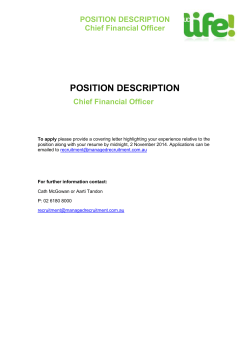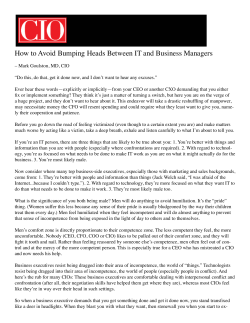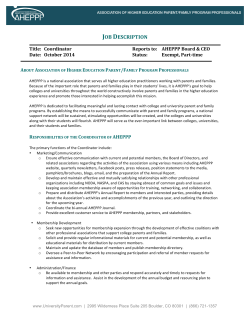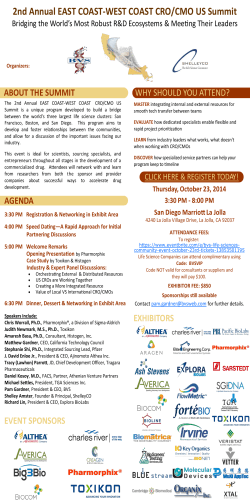
CEO`s - Weber Shandwick
The CEO Reputation Premium: Gaining Advantage in the Engagement Era The past several years have not been easy for big business and its leaders. Despite the numerous threats CEOs have faced to their reputations and those of the companies they run, Weber Shandwick’s research continues to find that CEO reputation is a fundamental driver of corporate reputation and is unwavering in its contribution to market value. REPUTATION VISION CEO reputation is a premium form of currency and wealth in an economy where companies trade on their reputations every day. This CEO premium exerts enormous influence over enterprises and within the industries they operate and should never be underestimated or neglected. GLOBAL OUTLOOK COMMUNICATION In The CEO Reputation Premium: Gaining Advantage in the Engagement Era, Weber Shandwick revisits the realm of CEO reputation to better understand what is required of leaders today. With partner KRC Research, we surveyed more than 1,700 executives, managers up to the C-suite, excluding CEOs. Respondents worked in companies with revenues of $500 million or more and represented 19 countries worldwide. 1. DECISIVENESS SOCIAL MEDIA CEO Reputation Matters Global executives attribute Global executives attribute 45% 44% 50% of their company’s reputation to the reputation of their CEO, on average of their company’s market value to the reputation of their CEO, on average of global executives expect that CEO reputation will matter more to company reputation in the next few years The interdependence between CEO reputation, company reputation, and market value demonstrates that leadership is a resource worth investing in and cultivating. In addition to enhancing market value, a strong CEO reputation… 87% 83% attracts investors 2. 83% generates positive media attention 77% affords crisis protection 70% attracts new employees retains current employees What It Takes: The CEO Reputation Premium What attributes drive strong CEO reputation? By wide margins, highly regarded CEOs, relative to lesser regarded CEOs, have a clear vision for the company, are inspirational and motivational to others, are honest and ethical, and communicate well internally. Descriptions of CEOs (according to their executives) 80% HIGHLY REGARDED CEOs 70% 60% 50% 40% The CEO Reputation Premium 30% POORLY REGARDED CEOs 20% 10% 0 Has a clear vision for the company 3. Inspires and motivates others Is honest and Is a good Cares that the ethical communicator company is a internally good place to work Has a global Is a good business communicator outlook externally Is decisive Is focused on customers CEO Public Engagement is the New Mandate 81% of global executives report that it is important for CEOs to have a visible public profile for a company to be highly regarded. Highly reputable CEOs are good at external relations. Words/phrases that describe CEO (according to their executives) Good external communicator 13% Comfortable talking with news media Wins awards for company or self 50% 19% 34% 9% Poorly Regarded CEOs Highly Regarded CEOs 47% Significantly higher than executives with poorly regarded CEOs CEO visibility is more likely to improve corporate reputation than harm it. Yet, CEO visibility needs to be handled with care. Impact of CEO being highly public or visible... 10% Hurts company reputation 41% Equally improves and hurts company reputation 41% Improves company reputation 4% Neither 4. 4% Not sure CEOs Need an External Profile in More Ways Than One Executives believe it is important for CEOs to partake in external relationship-building and shine a spotlight on their company. External visibility activities that are important for CEOs to do 64% 82% Speak at events Be active in local community 71% 63% Be accessible to the news media Be visible on the corporate video channel 53% 68% Be visible on the company website Hold positions of leadership outside the company 52% 67% Share new insights and trends with the public 5. Publicly take positions on issues that affect society at large CEO Social Media Engagement Comes with Reputational Rewards Highly regarded CEOs are more than three times as likely as CEOs with weak reputations to participate in social media. 25% 24% 20% CEO Participates in Social Media Highly Regarded CEOs 15% 10% 5% Poorly Regarded CEOs 7% 0 6. CEOs Should Exercise Caution When Taking a Stance on Public Policy Executives are more likely to think that it is inappropriate for CEOs to take a public position than it is important to take a public one. CEOs should carefully weigh the pros and cons and be sure that their stand aligns closely with their company’s business goals. CEOs taking public positions on policy or political issues 36% 7. Important for CEOs to do 48% Inappropriate for CEOs to do The CEO’s Guide to Reputation and Public Engagement Weber Shandwick recommends that business leaders and their companies consider the following strategies to bolster CEO engagement on a visible scale and reap the reputational benefits that come with effectively engaging stakeholders wherever they happen to be. Assess the CEO’s REPUTATIONAL PREMIUM. Carefully evaluate CEO’s STANCE ON PUBLIC POLICY. Develop the CEO’s "EQUITY" STATEMENT. Decide which VENUE is right for the CEO. Identify and develop the CEO’s STORY on behalf of the company. Develop a SOLID SOCIAL STRATEGY. Be an industry ADVOCATE. Keep REPUTATION DRIVERS at the top of your to-do list. Leverage the BENCH. Bolster CEO reputation among your own EMPLOYEES. Bulk up on MEDIA TRAINING. Don’t view CEO HUMILITYas a weakness. For more information about The CEO Reputation Premium: Gaining Advantage in the Engagement Era, please contact: Micho Spring Chair, Global Corporate Practice Weber Shandwick [email protected] /WeberShandwick Leslie Gaines-Ross Chief Reputation Strategist Weber Shandwick [email protected] /WeberShandwick Carol Ballock EVP, Executive Equity & Engagement Lead Weber Shandwick [email protected] /WeberShandwickGlobal Bradley Honan CEO KRC Research [email protected] @WeberShandwick /company/Weber-Shandwick +WeberShandwick
© Copyright 2026











